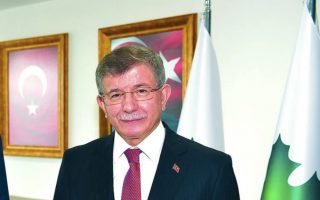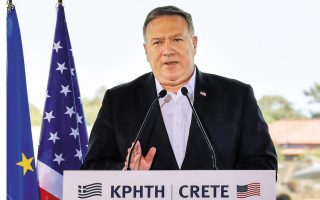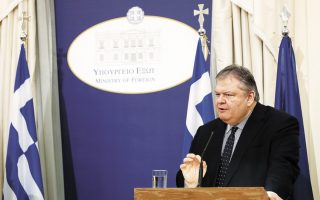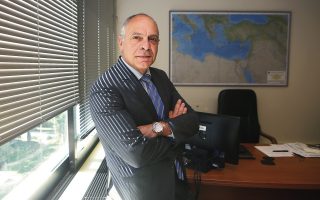Issues cannot be ‘swept under the rug,’ FM tells Kathimerini after Ankara visit
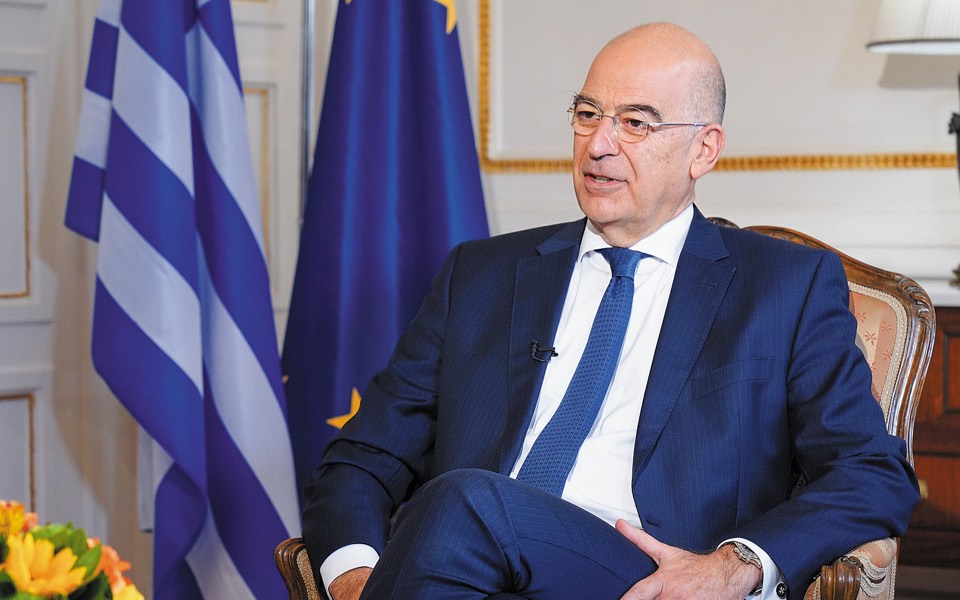
The gradual improvement of relations with Turkey will not be an easy affair, Greek Foreign Minister Nikos Dendias told Kathimerini in his first interview following the dramatic press conference with his Turkish counterpart Mevlut Cavusoglu in Ankara last Thursday.
Dendias stresses that “it is impossible to sweep issues under the rug over which we have a different understanding and approach.” However, he points out that the meeting, despite the clash in public view, can be the first chapter of a gradual improvement of Greece’s relations with Turkey. In fact, he remarks that he and Cavusoglu will attempt to meet again in Athens, in an effort to create the necessary conditions for a meeting between Prime Minister Kyriakos Mitsotakis and Turkish President Recep Tayyip Erdogan. Dendias refers to the positive agenda, with Deputy Minister Kostas Fragogiannis in charge of the important financial points.
Dendias does not believe that there is a hardening of the Turkish position on issues related to the Aegean and Eastern Mediterranean, but does observe that there is a “cementing of positions that diverge from international law,” a fact that makes the prospect of solving the differences seem particularly bleak, but not impossible.
As to the Mutual Defense Cooperation Agreement (MDCA) that is being discussed between Athens and Washington, Dendias expects that its signing could be combined with a visit by US Secretary of State Antony Blinken to Athens. He points out that, apart from the technical details, what is important is the strategic aspect of Greece’s relations with the United States.
Did the public confrontation with Mevlut Cavusoglu reflect the content of your meetings as well?
Yes, there were differences with the Turkish foreign minister, my friend Mevlut Cavusoglu, in spite of the very good climate that had been created in the discussion. Each side expressed its positions, both during the talks and publicly, during which I elaborated on Greece’s fixed positions, which are, after all, well known. There was clearly no convergence on a number of issues. That said – and I want to stress this – the aim of my visit to Ankara, the first by a Greek foreign minister since 2015, was to explore the potential for a positive agenda with Turkey so that we could achieve, to begin with, a climate of de-escalation, not consensus. We hope that this rapprochement will gradually bring a notable improvement in bilateral relations – to the benefit of both neighbors and both peoples, who are, after all, connected by so much.
The Mitsotakis government has always sought to improve bilateral relations and EU-Turkish relations. We submitted specific proposals to this end, for a string of important areas, such as the economy, trade, transport, electric energy – within the framework of cooperation with Bulgaria as well – telecoms and so forth. We also proposed that the relevant working groups, some of which have not met for years, be convened. And I would like to note that this initiative received an immediate response from the Turkish side, which also submitted its own proposals, creating a clear framework within which a constructive discussion is possible. You will also allow me to reiterate that the meeting with the Turkish president, Mr [Recep Tayyip] Erdogan, was also positive. I will also hold on to the symbolic importance we assign to the fact that the Turkish president received the Greek minister of foreign affairs.
For our part – as expected – I reiterated our commitment to international law and European values. In this spirit, and despite how the press conference was portrayed, I would like to believe that, as I said, this visit could serve as the first act in a gradual improvement of relations with Turkey. It is not an easy matter. We will have to work together to achieve this goal. And we cannot sweep issues over which we have a different understanding and approach under the rug. We have to do the work, and this is why contacts will continue at the political level. I invited my Turkish counterpart, my friend Mevlut, to visit Athens at a date we will both agree upon. That meeting can also act toward preparing a meeting between the prime minister, Mr Mitsotakis, and the Turkish president, Mr Erdogan.
Is there a chance there will be an agreement on the Aegean and the Eastern Mediterranean in this climate, especially when Turkey keeps raising issues that for Greece are red lines? Do you see Turkey’s stance hardening?
I don’t see a hardening of Turkey’s position on issues regarding the Aegean and the Eastern Mediterranean. But I see a cementing of positions that diverge from international law. Something which makes the prospect of an agreement difficult, but not impossible. If we adopt common rules, that is if Turkey accepts the UN Convention on the Law of the Sea (UNCLOS), then a path to a solution could open up. Greece has already achieved a delimitation of exclusive economic zones with both Egypt and Italy; and we have agreed with Albania to bring the issue before the International Court of Justice in The Hague. The issue we have been facing with Turkey up to now is that there is no common ground regarding the framework to resolve our differences. That is, while Greece has noted that resolving the issue must be done according to international law, in this case with UNCLOS, which has been accepted by the overwhelming majority of UN member-states, Turkey has not accepted this framework and adopts positions that are groundless and beyond the bounds of international legality.
I pointed out the difference in our approaches in the talks with my Turkish interlocutors. And we agreed to disagree, initially, before the press event, in a friendly climate. But, I hope that Turkey will change its position and will align itself with the other countries.
I should note that countries such as the US, which have not ratified UNCLOS, still consider it a fundamental norm regarding Law of the Sea issues, as was noted in the recent summit [between India, the United States] Japan and Australia.
Is the Eastern Mediterranean part of a likely negotiation with Turkey? Is it on the agenda of the exploratory talks? And, concerning Libya, is the inactivation of the Turkish-Libyan memorandum the best possible option?
Allow me to be very brief regarding the first part of your question. Our position is that we must delimitate the exclusive economic zone and, by extension the continental shelf, with Turkey, both in the Aegean and the Eastern Mediterranean, always on the basis of international law. That is the only issue discussed in the exploratory talks. And we are looking forward to the 63rd round of the talks, in Turkey.
Regarding the Turkish-Libyan “memorandum,” I noted, both in my talks with Libyan officials [last] week and in Ankara, the clear position adopted by the European Union since December 2019. Let me emphasize this: This position is not just Greece’s position. It is the considered opinion backed by all 27 EU members. The “memorandum” is null, illegal and cannot produce legal outcomes.
During my recent meeting with the speaker of the Libyan House of Representatives, Mr [Aguila] Saleh [Issa], he told me straightforwardly that this “memorandum” will not be ratified by the Libyan Parliament. And he also mentioned a recent ruling by a Libyan court to that effect. A ruling based on a parliamentary recourse.
In the ongoing negotiations on the renewal of the Mutual Defense Cooperation Agreement with the United States, is Greece seeking guarantees that include financial assistance or greater access to US military surplus? Are we discussing bases or the stationing of forces in vital areas?
The negotiations to renew the MDCA between Greece and the US is a process in which the Defense Ministry has a defining role to play. In this context, you must allow me to not go into the details of the ongoing negotiations.
But I would like to emphasize the importance we place on concluding the negotiations as soon as possible, ideally before the end of the summer. If the prevailing epidemiological conditions allow it, the signing of a new deal could coincide with a visit by my American counterpart, Antony Blinken, to Athens. We have already discussed the issue in a telephone call, but also when we met during the wider meeting of the NATO foreign ministers a few weeks ago.
I should also stress that beyond the technical details of renewing the deal, its importance lies in the strategic role the United States now attributes to Greece. And that is much bigger than many issues that will be included in the renewed agreement.
Of course, as we have already pointed out to the American side, the renewed agreement must also mirror the particularly close connection that has developed between our two countries, including during the previous administration. The manner in which this relationship can be materialized in the agreement is yet to be defined.
To conclude on this issue, let me highlight that routes of direct communication have already been developed between the leaders of the two countries, starting with President Joe Biden and Prime Minister Kyriakos Mitsotakis. In this context, the deal must be seen as one more link connecting the two countries in most sectors.

